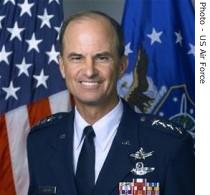2006年VOA标准英语-US Commander Wants Better Awareness of What's i(在线收听)
By Al Pessin
Washington
28 September 2006
 US Air Force Gen. Kevin Chilton |
||
-----
General Kevin Chilton says his focus since he took over as space commander in June has been improving what the military calls 'situational awareness.' For the Space Command, that means knowing what every country and corporation has in space, and also monitoring any activity that could affect the operation of U.S. military satellites.
"It's not necessarily that we need more and different sensors, although we are working to upgrade all of our space surveillance sensors right now. That program is in place, either looking at new technology developments or actually upgrading them," he said. " lot of it has to do with how we use the data, how we bring the data into the Space Control Center out there, and then how we display it. Right now, too much of the data is having to be fused in the minds of human beings, and we can do better than that."
General Chilton says he wants his officers responsible for space operations to know as much about traffic and potential threats in outer space as their counterparts know about conventional airspace.
The U.S. military relies on satellites for a variety of functions, including surveillance and precise navigation and targeting. It is also working on a space radar system, which advocates say would be more effective than ground-based radar, and less susceptible to problems caused by weather.
Military commanders say much of what they do every day in Afghanistan and Iraq relies, at least in part, on information gathered by Space Command's assets.
In a speech at an Air Force convention, General Chilton spoke about the increasing space capabilities of other countries, and said that means the United States needs to re-focus on its own military space program. Asked at a news conference about China's growing space capabilities, including a report that it has tested a system for jamming data from space, the general declined to answer specifically, but he said the U.S. military must improve its ability to defend all parts of its space program.
"What vulnerabilities do you worry about? You've got to be able to protect your ground stations. You have to worry about the links between the ground station and the satellites. And then, of course, you worry about the bird (satellite) on orbit, and things that could happen to it, either man-made or natural. So, when you start looking at threats to space capability, you can't just look at the satellite, and you can't just look at the link on the ground, you've got to look at the end-to-end system that brings the capability to you," he said.
But General Chilton said his command is not working on any space-based weapons. That is a controversial subject that has been part of a two-year effort at the White House to develop a new U.S. space policy. The current policy document on space is 10 years old, and officials say so much has changed in technology, as well as the amount of reliance on space assets, and potential threats and adversaries in space, that a new policy is needed.